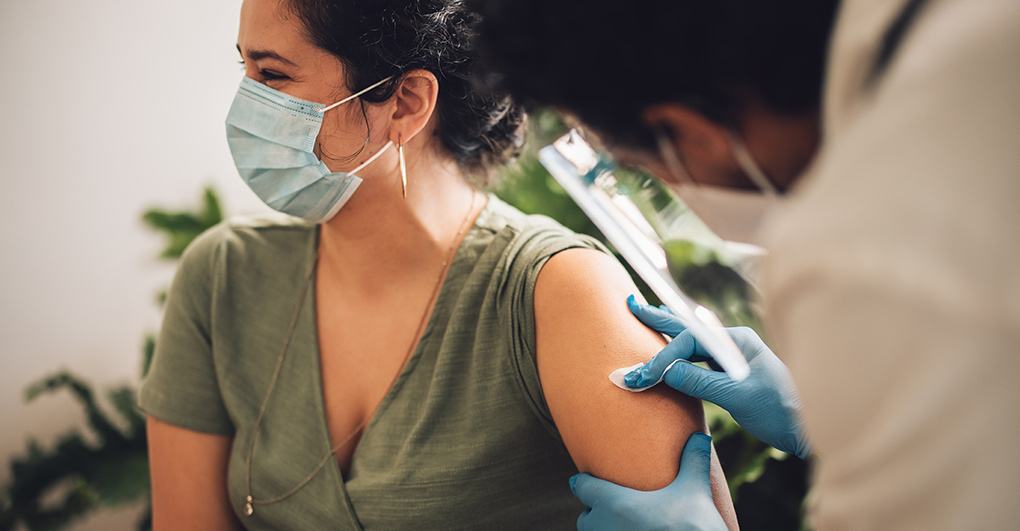Have a Question About the Vaccine Mandate? We’ve Got You Covered!
AFGE’s Top 11 Remaining Priorities for 2021
October 19, 2021Biden Launches New Program to Protect Workers from Extreme Heat
October 19, 2021
COVID-19 is the deadliest disease in American history, killing more than 700,000 people in the U.S., surpassing the death toll of the 1918 influenza pandemic that killed 675,000.
AFGE has been proactive in our efforts to protect our members from the pandemic since the very beginning. From procuring personal protective equipment (PPE) for members when their agencies failed to do so to demanding expanded telework opportunities to prevent unnecessary infections, our union has played a major role in preventing avoidable deaths and illnesses among employees of federal agencies and the public we serve.
Likewise, throughout the pandemic, we’ve insisted that agencies listen to the voices of front-line workers. Ever since the several safe and effective vaccines became free and widely available, AFGE has encouraged our members to get vaccinated. But we’ve also said that we must negotiate policy changes related to COVID-19, including vaccine mandates.
Studies both in the U.S. and abroad have shown that the vaccines work. According to a study from Yale Health released in July this year, the vaccines have so far prevented nearly 280,000 deaths and 1.25 million hospitalizations in the U.S. alone. Another analysis by the Kaiser Family Foundation concluded that 90,000 deaths could have been prevented between June and September of 2021 alone if more Americans were vaccinated.
Indeed, nearly all COVID deaths are among the unvaccinated. With the arrival of the Delta variant, which is much more contagious and more likely to put infected people in the hospital, it’s more important now than ever that AFGE members get vaccinated.
President Biden Sept. 9 announced a new plan to combat the spread of the virus, including requiring federal workers to get vaccinated as a condition of employment with limited exceptions.
AFGE has said we want to negotiate over these changes, and, at many agencies, our union is engaged in negotiations over impact and implementation. Where agencies are holding out on negotiations, we continue to press to get them back to the table quickly so we can resolve our members’ lingering issues.
We have also posted Frequently Asked Questions on our website to help rank-and-file AFGE members navigate the mandate.
Here are some of the frequently asked questions:
What does the November 22 deadline refer to?
November 22 is the date by which you must be fully vaccinated. You are considered fully vaccinated two weeks (14 days) after you receive your final dose of vaccine. That means you must receive your final dose of vaccine by November 8.
When should I receive my final dose of vaccine to ensure I am fully vaccinated by the November 22 deadline?
You must receive your last dose of the vaccine no later than November 8, 2021, to meet the November 22, 2021, deadline to be fully vaccinated.*
The timing between the first and second shots depends on which vaccine is received. Refer to the table below to see the deadline for the first dose so you are fully vaccinated by the November 22 – and read on for further information.
|
Vaccine |
1st Dose By |
2nd Dose By |
Fully Vaccinated |
|
Pfizer-BioNTech |
Oct 18 |
Nov 8 |
Nov 22 |
|
Moderna |
Oct 11 |
Nov 8 |
Nov 22 |
|
Johnson & Johnson |
Nov 8 |
N/A |
Nov 22 |
Pfizer-BioNTech COVID-19 vaccine , then you should get your second shot 3 weeks (or 21 days) after the first. You should receive your first vaccination no later than October 18. You would not be eligible for the second dose until November 8, which is the deadline by which you need to have received both shots.
Moderna COVID-19 vaccine , then you should get your second shot 4 weeks (or 28 days) after your first. This means for you to meet the vaccination deadline, you should receive your first vaccination no later than October 11. You would not be eligible for the second dose until November 8, which is the deadline by which you need to have received both shots.
Johnson & Johnson vaccine , then you have until November 8 to receive the single shot and still meet the November 22, 2021 deadline to be fully vaccinated.
Depending on your location, not all types of vaccines may be available. You should plan ahead and allow enough time to receive all required vaccine doses.
* This does not apply to Veterans Health Administration employees, who must be fully vaccinated by October 8.
What is the legal authority for a vaccine mandate?
For employees of executive branch agencies, the president has broad constitutional authority, recognized within the relevant statutes governing federal employee rights, to set conditions of employment that are not in conflict with any specific legal prohibitions. A vaccine mandate does not run afoul of any such prohibitions.
There is case law bearing directly on the issue of whether the federal government can require employees to be vaccinated as a condition of employment. In that case, two civilian employees were ordered to take an anthrax vaccine, refused, were removed from federal service, and their removal was upheld by the MSPB and Federal Circuit Court.
In short, President Biden’s legal authority for such a mandate is clear. AFGE members must comply with this vaccine mandate or risk discipline, up to and including removal.
What is AFGE’s position on the vaccine mandate?
We encourage all AFGE members to get vaccinated, and have said that changes such as this should be the subject of negotiations prior to implementation. The data is clear. Getting vaccinated isn’t just the best way for us to end this pandemic, it’s the best way for us to protect each other in the workplace. We also support exceptions for health and/or religious reasons.
What is AFGE doing about the vaccine mandate?
We continue to press the administration to require all agencies to meet bargaining obligations prior to implementation of this mandate. In addition, we have made clear that there must be reasonable accommodations and appropriate exceptions, e.g., medical and religious exceptions, as the order requires. While the scope of bargaining is likely to be limited, AFGE will make sure that the union has a voice in all areas that are negotiable, including procedures and appropriate arrangements, and that our collective bargaining agreements are honored.
Do I need to get vaccinated even if I’m working remotely 100% of the time?
Yes.
This content is restricted to site members. If you are an existing user, please log in. New users may register below.
Share via:






